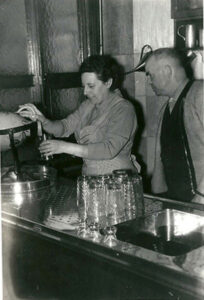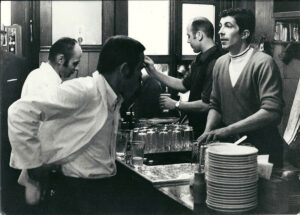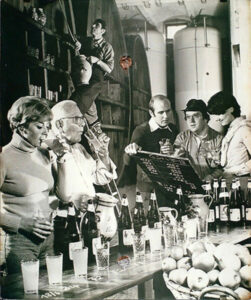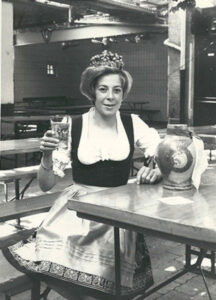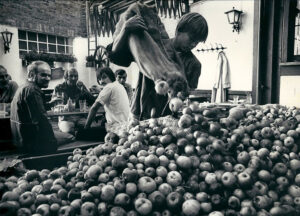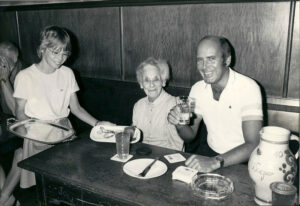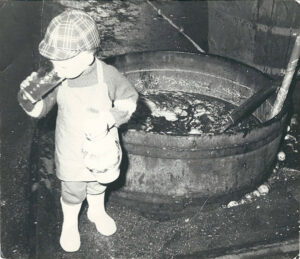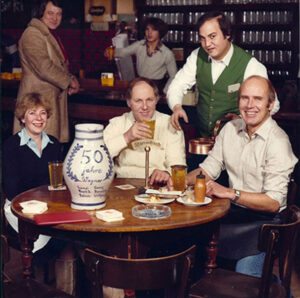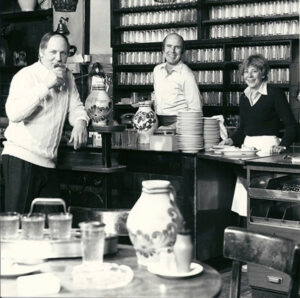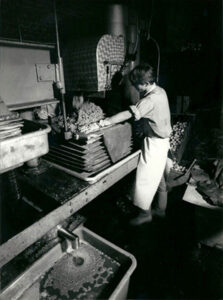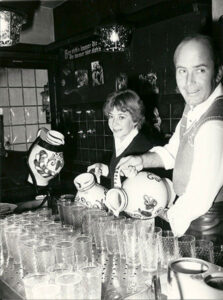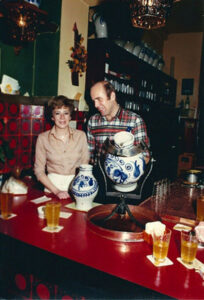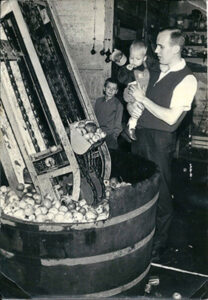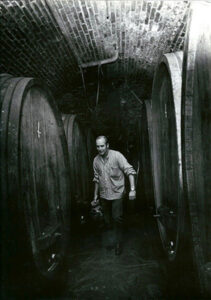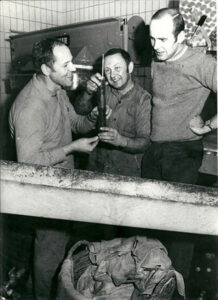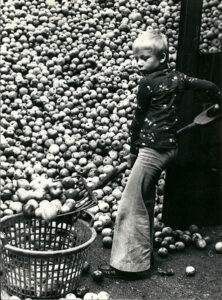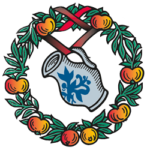
History
Since 1931, guests have come together here – united over a “Schoppen” and Frankfurt classics.
The Beginnings (1902–1931)
As early as 1902, an apple wine tavern was located at Schweizer Straße 71 in Frankfurt-Sachsenhausen. In 1931 – in the midst of the Great Depression – Adolf Wagner and his wife Leni took the bold step of purchasing the property. A courageous move in uncertain times.
After extensive renovations, the first glass of apple wine was served on December 19, 1931. Since that day, the Apfelweinwirtschaft Adolf Wagner has remained family-owned – now already in its third generation.
A Love for Apples
Then as now, the tavern keepers of Sachsenhausen were closely connected to apple wine. Before World War II, there were over 50 apple wine producers in the area. Apples were often grown locally – supplemented by purchases from the Taunus, Odenwald, or Spessart regions.
Adolf Wagner brought ideal qualifications to the table: He came from one of the oldest Sachsenhausen families, which had run seasonal wine taverns for generations. As early as 1886, the “Klaane Sachsenhäuser” apple wine tavern was founded – still a fixture of Frankfurt’s apple wine culture today.
Family, War, and Reconstruction
Adolf and Leni quickly won the respect of their guests – in a time when almost only locals came to enjoy a glass. They had three daughters: Helma (1933), Susanne (1937), and Elfriede (1944). A male heir was missing – something considered a challenge back then.
During World War II, it was largely forbidden to press fruit. In 1943, the tavern was even forced to close. The family survived solely on horticulture until 1948. But then came the upswing: The cider press was restarted, and the green spruce wreath – the symbol of apple wine taverns – once again hung above the entrance.
Some years were so successful that the entire stock of apple wine was sold out by late summer, and new wine could only be served again in December – once the next vintage had matured.
Becoming an Institution
After the war, guests initially had to make do with pear wine from Switzerland – better than nothing. But soon, apples were growing again around Frankfurt, and pressing resumed. Business flourished, paving the way for modernization: The old cast iron stove was replaced with central heating, new restrooms were added, and a cold storage room was installed.
In 1968, Adolf Wagner died of a heart attack at only 66 years old. His wife continued running the tavern until 1970 and then handed it over to their daughters Susanne and Elfriede – the next generation.
During the 1970s, not only the establishment changed, but also the guests: Apple wine was suddenly trendy, the menu was expanded, the clientele grew younger, and the house became more modern. In 1972, another renovation followed – with the kitchen and cellar being brought up to date.
Today: In the Third Generation
After 25 years, Susanne and Elfriede handed over the business to their sons: Ralf Wagner and Harald Rudorf. They, too, managed the tavern with a feel for tradition – and an eye for thoughtful modernization. The interior was redesigned, and the garden expanded – all without losing the typical Wagner charm.
Today, the tavern is well-equipped to serve even large groups quickly and warmly. The third generation is proud of six children – the fourth generation of the “Wagner” family is already waiting in the wings.
The story continues – just as it should for a true Frankfurt original.
Ebbelwoi
Apple wine – a tradition with deep roots
Even if not in its Hessian form, apple wine was already known to the ancient Greeks and Romans.
In regions where grape cultivation was difficult due to climate or soil conditions, fruit wine became the traditional alternative. Often referred to as cidre – a sweeter apple wine with a higher alcohol content – it has long been produced across Europe. In Hesse, however, apple wine is made using traditional methods: without added sugar and fully fermented.
Like other wines, apple wine can be preserved. Traditionally, this is done by adding a small percentage of particularly acidic fruits, which help clarify and stabilize the wine. One of these fruits is the Speierling – not an apple, but a fruit from the rowan family (sorb tree).
Apple wine is often seen as a light, refreshing drink – especially when mixed with sparkling water (gespritzt). But in fact, it is a true fruit wine: when properly pressed and fermented, it is a pure and natural product. While its flavor is distinctly tart, it is no more bitter than many classic grape wines.
The Magic Triangle
Three things belong to every apple wine experience:
the classic ribbed glass (Geripptes)
the stoneware jug (Bembel)
a small wooden lid (Deckelchen) to keep out flies and dirt
Together, they form the Magisches Dreieck – the “magic triangle.”
And anyone who has ever finished a Bembel on their own knows exactly why it’s called that.
